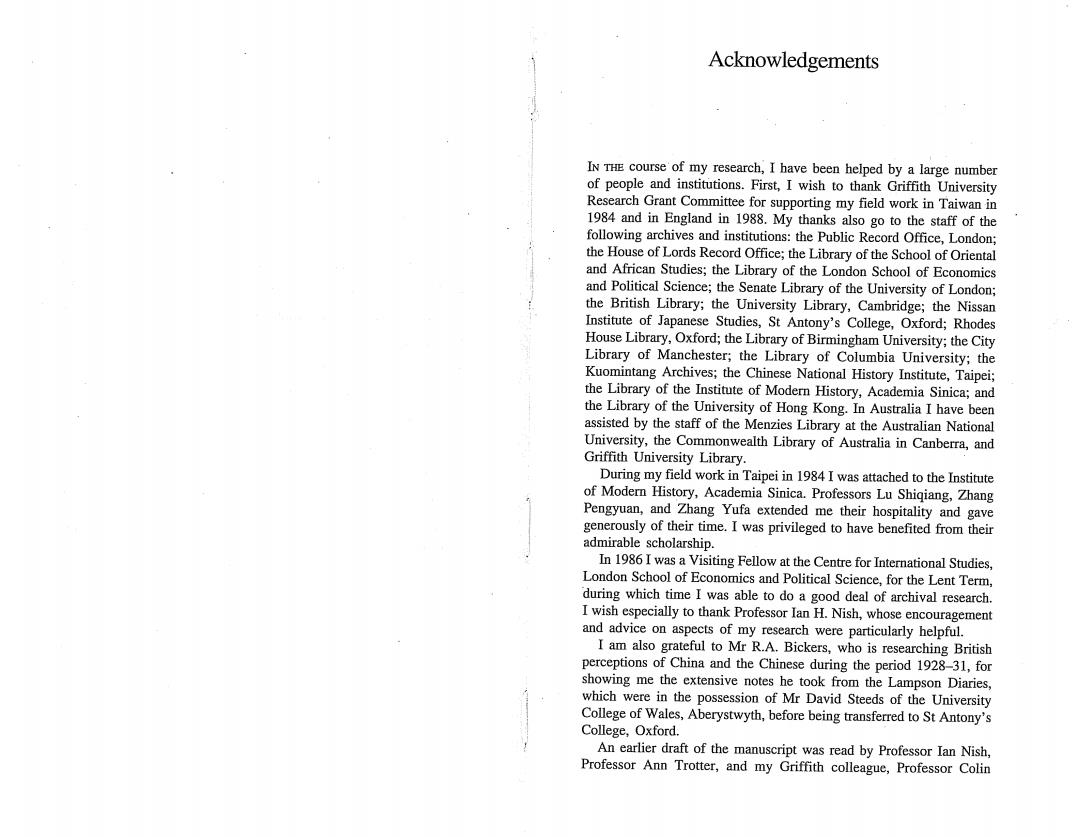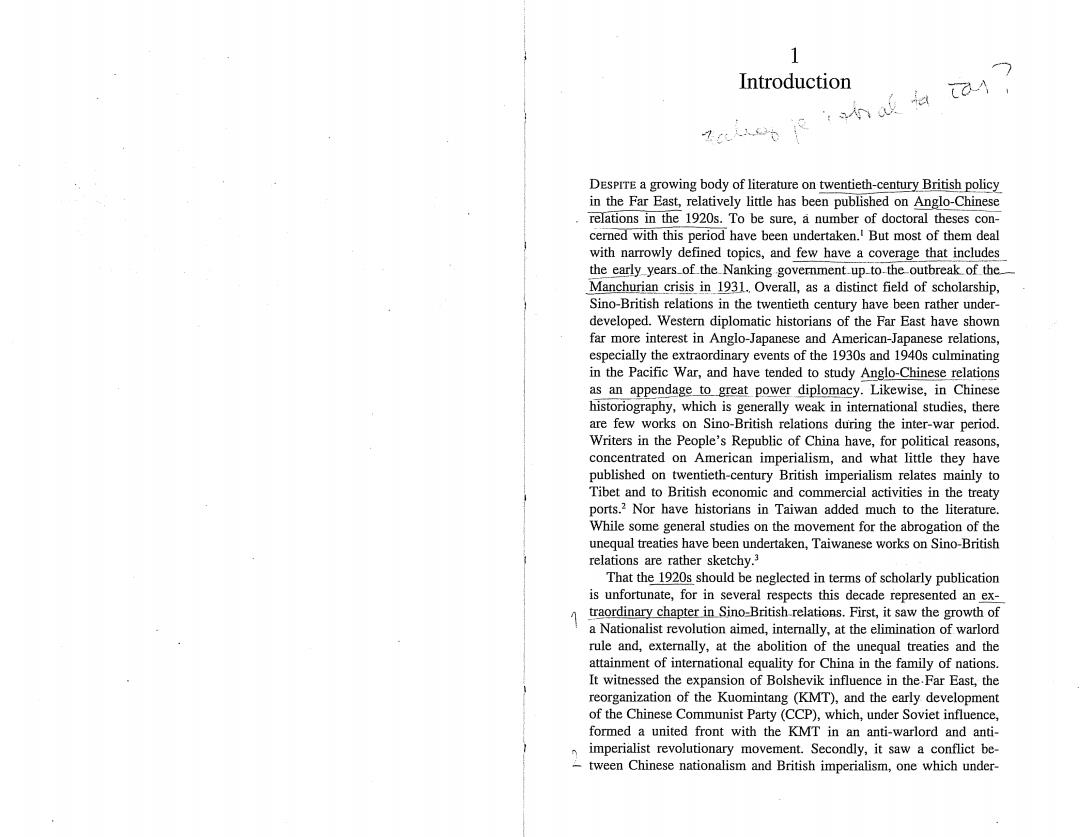
32141 20567 EAST ASIAN HISTORICAL MONOGRAPHS 下f1 The Diplomacy of Imperial Retreat General Editor.WANG GUNGWU Britain's South China Policy,1924-1931 The East Asian Historical Monographs series commenced publication in the late 1960s with the aim of encouraging scholars of Asian history to go beyond the study of Westem activities in Asia as seen from Westem points of view..Since that time the series has published important works which reflect a strong awareness of the economic and socio- cultural factors in Asia which lie behind political events in the region.The series has established a reputation for the publication of works of innovative historical scholarship. The study and reassessment of Chinese history has assumed a greater importance over the last decade,and the publishers have decided that the series will now concentrate upon works examining the history of China,Hong Kong,and Taiwan. It is the hope of the publishers that the series will continue to meet the demand for Edmund S.K.Fung historical works and to bring the fruits of the research of the region's scholars to a wide reading public. Other titles in this series are listed on the back flap 中研院近史所圖書館 3 055010020567 HONG KONG OXFORD UNIVERSITY PRESS OXFORD NEW YORK 1991

Contents Acknowledgements ix Romanization xi 1 Introduction 1 2 The China Problem 13 3 British Troubles in South China 30 4 British Response to the Crisis 55 5 The Making of a New China Policy 81 6 The Retreat Begins 105 7 Conciliation and Firmness 129 8 Changes in Chinese Foreign Policy 153 9 London and Nanking,1928-1931 170 10 The Issue of Extraterritoriality 195 11 The Limits of Retreat 215 12 Conclusion 239 Notes 250 Glossary 286 Bibliography 289 Index 303

Acknowledgements IN THE course of my research,I have been helped by a large number of people and institutions.First,I wish to thank Griffith University Research Grant Committee for supporting my field work in Taiwan in 1984 and in England in 1988.My thanks also go to the staff of the following archives and institutions:the Public Record Office,London; the House of Lords Record Office;the Library of the School of Oriental and African Studies;the Library of the London School of Economics and Political Science;the Senate Library of the University of London; the British Library;the University Library,Cambridge;the Nissan Institute of Japanese Studies,St Antony's College,Oxford;Rhodes House Library,Oxford;the Library of Birmingham University;the City Library of Manchester;the Library of Columbia University;the Kuomintang Archives;the Chinese National History Institute,Taipei; the Library of the Institute of Modern History,Academia Sinica;and the Library of the University of Hong Kong.In Australia I have been assisted by the staff of the Menzies Library at the Australian National University,the Commonwealth Library of Australia in Canberra,and Griffith University Library. During my field work in Taipei in 1984 I was attached to the Institute of Modern History,Academia Sinica.Professors Lu Shiqiang,Zhang Pengyuan,and Zhang Yufa extended me their hospitality and gave generously of their time.I was privileged to have benefited from their admirable scholarship. In 1986 I was a Visiting Fellow at the Centre for International Studies, London School of Economics and Political Science,for the Lent Term, during which time I was able to do a good deal of archival research. I wish especially to thank Professor Ian H.Nish,whose encouragement and advice on aspects of my research were particularly helpful. I am also grateful to Mr R.A.Bickers,who is researching British perceptions of China and the Chinese during the period 1928-31,for showing me the extensive notes he took from the Lampson Diaries, which were in the possession of Mr David Steeds of the University College of Wales,Aberystwyth,before being transferred to St Antony's College,Oxford. An earlier draft of the manuscript was read by Professor Ian Nish, Professor Ann Trotter,and my Griffith colleague,Professor Colin

ACKNOWLEDGEMENTS Romanization Mackerras.I am grateful to them for their time as well as their com- ments and criticisms.Another Griffith colleague,Dr John Butcher,also read it in part,despite his heavy teaching load.It is my pleasure to thank him whole-heartedly. Finally,for help in innumerable ways and for her patience and tol- erance over the years while this book was being written,my special THE pinyin system is used throughout this book for the romanization thanks to my wife,Lucia. of Chinese names and terms except in instances where the old spellings are familiar even to the non-specialist,as for example,Peking and all the major treaty ports."Taipei',not "Taibei',is used in the notes and bibliography.Conventional spellings are also retained for the Kuomintang (KMT),Sun Yat-sen,Chiang Kai-shek,T.V.Soong,H.H.Kung,and some well-known Chinese diplomats and officials who were better known to foreigners in their English names or old spellings,such as Eugene Chen,C.T.Wang,and C.C.Wu

1 Introduction 7人2的 DEsPrrE a growing body of literature on twentieth-century British policy in the Far East,relatively little has been published on Anglo-Chinese relations in the 1920s.To be sure,a number of doctoral theses con- cerned with this period have been undertaken.But most of them deal with narrowly defined topics,and few have a coverage that includes the early years_of the Nanking government up to-the outbreak of the Manchurian crisis in 1931..Overall,as a distinct field of scholarship, Sino-British relations in the twentieth century have been rather under- developed.Western diplomatic historians of the Far East have shown far more interest in Anglo-Japanese and American-Japanese relations, especially the extraordinary events of the 1930s and 1940s culminating in the Pacific War,and have tended to study Anglo-Chinese relations as an appendage to great power diplomacy.Likewise,in Chinese historiography,which is generally weak in international studies,there are few works on Sino-British relations during the inter-war period. Writers in the People's Republic of China have,for political reasons, concentrated on American imperialism,and what little they have published on twentieth-century British imperialism relates mainly to Tibet and to British economic and commercial activities in the treaty ports.2 Nor have historians in Taiwan added much to the literature. While some general studies on the movement for the abrogation of the unequal treaties have been undertaken,Taiwanese works on Sino-British relations are rather sketchy.3 That the 1920s should be neglected in terms of scholarly publication is unfortunate,for in several respects this decade represented an ex- traordinary chapter in Sino-British-relations.First,it saw the growth of a Nationalist revolution aimed,internally,at the elimination of warlord rule and,externally,at the abolition of the unequal treaties and the attainment of international equality for China in the family of nations. It witnessed the expansion of Bolshevik influence in the.Far East,the reorganization of the Kuomintang (KMT),and the early development of the Chinese Communist Party (CCP),which,under Soviet influence, formed a united front with the KMT in an anti-warlord and anti- imperialist revolutionary movement.Secondly,it saw a conflict be- -tween Chinese nationalism and British imperialism,one which under-